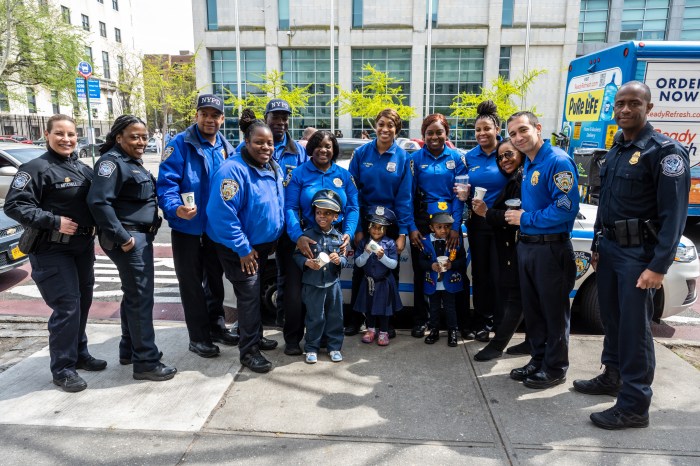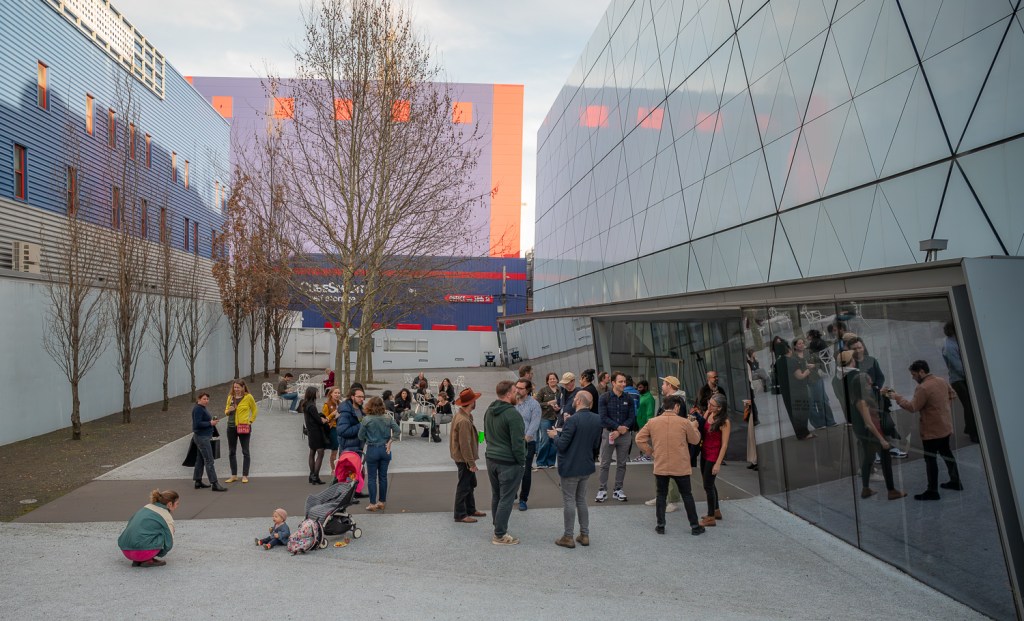Oscar Paredes stood in the auditorium of the Jewish Center of Jackson Heights, gathering answers shouted in Spanish from a group of men still dressed in their work outfits: an assortment of sweatshirts, construction boots and jeans. His associate Javier Gallardo, a member of the United Day Laborers of Roosevelt Avenue, a group that has tried since 2003 to organize undocumented workers in the largely Hispanic neighborhood, wrote their responses on the board. The question on the floor: How do we want police to act with us?
Paredes and Gallardo were hoping Thursday night for more than just a Q&A with day laborers, but, rather, for a dialogue with police officers from the 108th Precinct, who, at the behest of Assemblyman Jose Peralta, had agreed to meet with the group. The emergency meeting was spurred by the precincts recent ticket blitz of laborers, who generally line up along Roosevelt Avenue from 69th Street to 74th Street, starting as early as six each morning, in the hope that a contractor van or truck will pull up and motion them to get in.
But hopes of a dialogue were dashed when officers showed up at the center and then balked at staying when they learned that the public meeting had media in attendance. The police in attendance said that they were under the impression the talk was solely between the 108th and the laborers.
Seeks Dialogue
"We wanted to establish a relationship between the precinct and the workers," said Gallardo, whose group is part of the Latin American Workers Project Inc., a group that tries to organize day laborers throughout the city and establish job centers where the undocumented workers can congregate and obtain work without interference or hassles from police.
Group organizers had hoped that the 108th Precinct would explain to workers how not to break the rules and still earn a living.
Assemblyman Jose Peralta called the emergency meeting with the 108th because ticketing of laborers had increased in the last two weeks.
"Maybe their numbers have to go up on summonses," he said, noting that undocumented workers, since they congregate at the same spots each day, make good targets to meet ticket quotas. "Day laborers are easy prey."
Day laborers who gather on corners along Roosevelt Avenue are complaining that police from the 108th Precinct recently have hit them with reams of tickets. The violations vary, but they usually cite the workers for obstructing pedestrian traffic or loitering. Peralta called the precinct and requested a moratorium on the summonses until a meeting between the groups could take place. But a cessation did not happen and the summonses persisted.
The assemblyman said that the problem is solely with the 108th and that other precincts do not bother the laborers. "This is not coming from the 115th and 110th," he said about the police precincts that patrol the neighborhood.
Nuisance Tickets
To underscore the problem with the particular precinct, Peralta showed tickets given by 108th officers that were out of their jurisdiction. The location of one ticket issued by the 108th indicates 71st Street and 72nd Street on Roosevelt Avenue an area beyond the precincts patrol.
Police from the 108th Precinct declined to comment about the meeting and the ticketing. They directed press calls to NYPDs public affairs office. An NYPD spokesperson said that, generally, day laborers were not targeted by police. He said only when they are obstructing the movement of traffic or pedestrians or congregating in residential areas will police issue summonses. The spokesperson speculated that someone may have recently alerted or complained to police from the neighborhood the 108th covers, regarding the presence of day laborers in the neighborhood, but he had no explanation for the increase of issued violations.
"Is it a crime to look for work?" Gallardo asked the assembled laborers.
Galardo accused the 108th of lumping together laborers trying to make an honest living, with drug dealers and other criminals who wait on street corners. To differentiate the groups, organizers from the Latin American Workers Project Inc. said they are trying to get identification cards that the laborers could carry. They hope that police would recognize these card carriers as legitimate workers. The group is also working to set up a job center on Roosevelt Avenue, similar to one they have established in Bensonhurst, Brooklyn.
"It is sad to come in and see them take such a hostile tone," Andres Lema, an organizer at the Bay Parkway Day Laborers, also part of the Latin American Workers Project Inc.
He said that the organization of day laborers in Bensonhurst met similar ticket blitzes from police and even worse hostility from the neighborhood when it started. But now, the job center, aside from offering a common location for laborers and contractors to meet, provides English classes, enjoys good relations with the neighborhood and actively participates in Business Improvement District and Community Board meetings.
"Its working out well because the police department and day laborers started dialoguing and, after several months, they developed a comfort zone," said Peralta about the progression of the relationship between the Brooklyn police and Bay Parkway workers.
Eventually, the assemblyman said, the police realized they needed to work with the laborers, to the point where they are now directing contractors to the laborers job center.
"The police department was actually outside handing out flyers for the day laborers," he said.



























